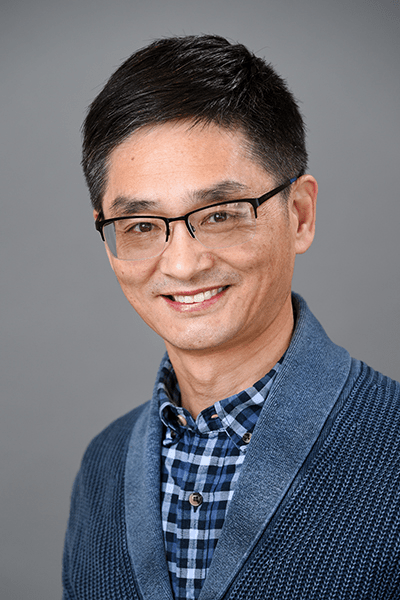
Xiaoming Jin, MD, PhD
Professor of Anatomy, Cell Biology & Physiology
Adjunct Professor of Neurological Surgery
- Phone
- (317) 278-5766
- Address
-
NB 500C, Neuroscience Research Bldg.
IN
Indianapolis, IN - PubMed:
-

Bio
ACADEMIC APPOINTMENTS
1992-1996: TCM Physician-in-Charge, Zhejiang Institute of TCM, Hangzhou, China.
2006-2008: Research Associate, Stanford University, Neurology
2009-2016: Assistant professor, Indiana University, Department of Anatomy and Cell Biology
2009-2016: Adjunct assistant professor, Indiana University, Department of Neurological Surgery
2016 - : Associate professor, Indiana University, Department of Anatomy and Cell Biology
2016 - : Adjunct associate professor, Indiana University, Department of Neurological Surgery
HONORS AND AWARDS
1995: Zhejiang Science and Technology Advancement Award, Zhejiang Province, China
2001: Graduate Student Travel Award, Society for Neuroscience
2007: Post-doctoral Research Training Fellowship, American Epilepsy Foundation
2007: Pathway to Independence Award (K99/R00), HIN-NINDS
Key Publications
Nguyen T, Al-Juboori M, Walerstein J, Xiong W, Jin X. Impaired glutamate receptor function underlies early activity loss of ipsilesional motor cortex following closed-head mild traumatic brain injury. J Neurotrauma. 2020 Nov 25. doi: 10.1089/neu.2020.7225. Online ahead of print. PMID: 33238833.
Yadav Adhikari, Xiaoming Jin. Intraperitoneal injection of lipopolysaccharide prevents seizure-induced respiratory arrest in a DBA/1 mouse model of SUDEP. Epilepsia Open, 31 May 2020.
Han X, Chai Z, Ping X, Song LJ, Ma C, Ruan Y, Jin X. In vivo Two-Photon Imaging Reveals Acute Cerebral Vascular Spasm and Microthrombosis After Mild Traumatic Brain Injury in Mice. Front Neurosci. 2020 Mar 10;14:210.
Jeffrey M. Witkin, Guanguan Li, Lalit K Golani, Wenhui Xiong, Jodi L Smith, Xingjie Ping, Farjana Rashid, Rajwana Jahan, Rok Cerne, James M Cook and Xiaoming Jin. The positive allosteric modulator of α2/3-containing GABAA receptors, KRM-II-81, is active in pharmaco-resistant models of epilepsy and reduces hyperexcitability after traumatic brain injury. J Pharmacol Exp Ther. 2020 Jan;372(1):83-94. PMID: 32232105
Jun Qian, Wei Wu, Wenhui Xiong, Zhi Chai, Xiao-Ming Xu, †Xiaoming Jin. Longitudinal optogenetic motor mapping revealed structural and functional impairments and enhanced corticorubral projection following contusive spinal cord injury in mice. J Neurotrauma. 2018. 2019 Feb 1;36(3):485-499.
Xiong W, Ping X, Ripsch MS, Chavez GSC, Elise Hannon H, Jiang K, Bao C, Jadhav V, Chen L, Chai Z, Ma C, Wu H, Feng J, Blesch A, White FA, Jin X. Enhancing excitatory activity of somatosensory cortex alleviates neuropathic pain through regulating homeostatic plasticity. Scientific Reports. 2017 Oct 6;7(1):12743. PMID: 28986567.
Xingjie Ping and Xiaoming Jin. Chronic posttraumatic epilepsy following neocortical undercut lesion in mice. PLoS One. 2016 Jun 27;11(6):e0158231.
Xingjie Ping and Xiaoming Jin. Transition from initial hypoactivity to hyperactivity in cortical layer V pyramidal neurons following traumatic brain injury in vivo. J Neurotrauma. 2015 Jun 21. PMID: 26095991.
Xiong W, Jin X. Optogenetic field potential recording in cortical slices. J Neurosci Methods. 2012 Jul 31. PMID: 22884773.
Sarah M. Wilson, Wenhui Xiong, Jessica D. Head, Joel M. Brittain, #Xiaoming Jin, #Rajesh Khanna. Prevention of posttraumatic axon sprouting by blocking collapsin response mediator protein 2-mediated neurite outgrowth and tubulin polymerization. Neuroscience. 2012 May 17;210:451-66. # Co-correspondent author. PMID: 22433297.
Xiaoming Jin, John R. Huguenard, David A. Prince. Reorganization of Inhibitory Synaptic Circuits in Rodent Chronically Injured Epileptogenic Neocortex. Cerebral Cortex. 2011 May; 21(5):1094-1104. PMID: 20855494.
†Wenhui Xiong, Xingjie Ping, Jianhua Gao, Xiaoming Jin. Preparing undercut model of posttraumatic epileptogenesis in rodents. J Vis Exp. 2011 Sep 15;(55). PMID: 21946525.
#Yunxiang Chu, #Xiaoming Jin, Isabel Parada, Alexei Pesic, Beth Stevens, Ben Barres, David A. Prince. Enhanced synaptic connectivity and epilepsy in C1q knockout mice. PNAS. 2010 Apr 27;107(17):7975-80. (# equal contribution). PMID: 20375278.
#Sanjay S. Kumar, #Xiaoming Jin, Paul S. Buckmaster, and John R. Huguenard (2007). Recurrent circuits in layer II of medial entorhinal cortex in a model of temporal lobe epilepsy. Journal of Neuroscience, 2007 Feb 7;27(6):1239-46. (# equal contribution). PMID: 17287497.
Xiaoming Jin, David A. Prince and John R. Huguenard (2006). Enhanced Excitatory Synaptic Connectivity in Layer V Pyramidal Neurons of Chronically Injured Epileptogenic Neocortex in Rats. Journal of Neuroscience, 2006 May; 26 (18): 4891 - 4900. PMID: 16672663.
Xiaoming Jin, Hang Hu, Peter H. Mathers, and Ariel Agmon (2003). Brain-derived neurotrophic factor mediates activity-dependent dendritic growth in nonpyramidal neocortical interneurons in developing organotypic cultures. Journal of Neuroscience, 2003 Jul; 23 (13):5662-5673. PMID: 12843269.
X. Jin, P. Mathers, G. Szabo, Z. Katarova and A. Agmon (2001). Vertical bias in dendritic trees of non-pyramidal neocortical neurons expressing GAD67-GFP in vitro. Cerebral Cortex. 2001 Jul; 11(7):666-78. PMID: 11415968.
| Year | Degree | Institution |
|---|---|---|
| 2006 | Postdoctoral Training | Stanford University School of Medicine |
| 2002 | PhD | West Virginia University |
| 1992 | MS | Zhejiang College of Traditional Chinese Medicine |
| 1989 | MD | Zhejiang College of Traditional Chinese Medicine |
We are interested in understanding cortical plasticity and reorganization in traumatic brain injury (TBI), posttraumatic epilepsy, and neuropathic pain, and developing novel treatments and prevention for these diseases. A major direction we have been focusing on is to test the role of homeostatic activity regulation in the mechanism and treatment of posttraumatic epilepsy and neuropathic pain. Other ongoing projects include determining the role of CD1d/NKT cell signaling in the development of posttraumatic epilepsy and using statins for its prevention, developing magnetoelectric nanoparticles for non-invasive and more efficient brain stimulation, and studying cortical plasticity after TBI. In addition, we explore the effects of acupuncture and traditional Chinese medicine on these diseases.